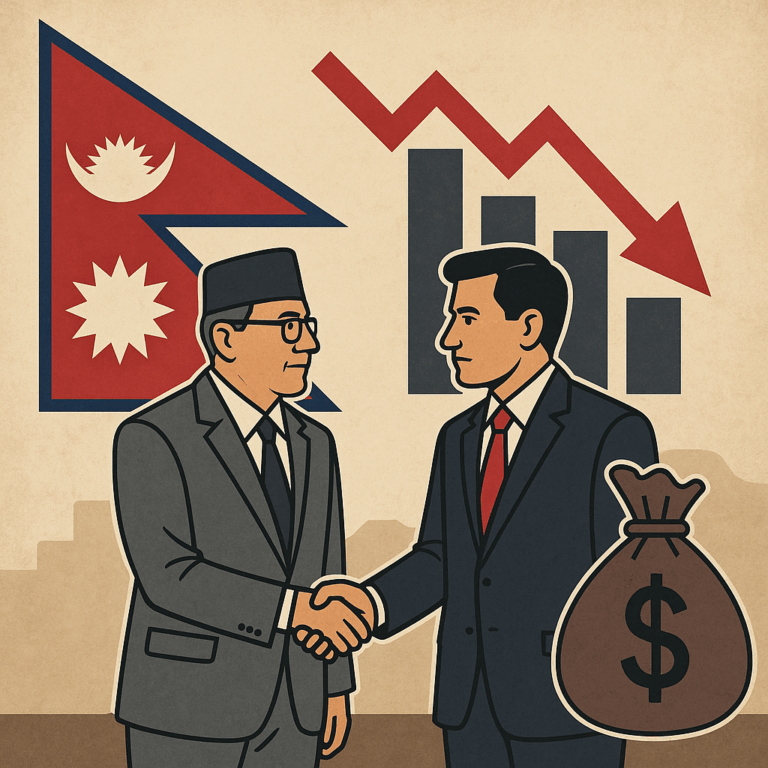KATHMANDU, July 15 — In parliamentary democracies, when rival political parties unite to form a government, it often signals a national emergency or a political necessity. Such alliances, known as Grand Coalitions, are formed when major opposing parties join forces to ensure stability particularly during times of war, economic crisis, or parliamentary deadlock.
Nepal marked one year since the formation of its own Grand Coalition between the two largest and traditionally adversarial parties, the Nepali Congress and the CPN-UML. The alliance, formed exactly one year ago, was framed as a step toward political stability, constitutional amendments, and economic revival.
However, the government’s performance so far has sparked debate over its effectiveness and relevance. Though no major government shakeups have occurred in the past year and political stability appears intact, key promises around constitutional reform and economic recovery have seemingly faded from the coalition’s priorities.
Economy Still Struggling
When the coalition was formed, Nepal’s economy had already been sluggish for two years. Domestic demand was low, industrial output had declined, and both domestic and foreign investments had slowed. The real estate and stock markets were stagnant, and long-stalled economic reforms showed no signs of revival.
In the coalition’s first year, Nepal was placed on the Financial Action Task Force’s (FATF) grey list, primarily due to poor enforcement of anti-money laundering and financial crime laws. The government’s lack of urgency in addressing FATF concerns stood out especially compared to 2012, when diplomatic efforts helped Nepal avoid being blacklisted.
Despite some short-term gains in the stock market after the coalition announcement, that optimism quickly faded. The government also failed to recover over Rs 3 billion in savings owed to cooperative depositors. A new Cooperative Regulatory Authority was created via ordinance, but concrete action to return funds has been absent.
Mixed Signals from Investment and Reforms
Although the government amended 29 business-related laws via ordinance to boost the investment climate, implementation has been slow. Regulatory guidelines remain incomplete for many of the new laws, and corruption has undermined reforms firms have reportedly had to pay bribes even to access legally mandated tax exemptions.
Private sector sentiment is divided. While some welcomed the government’s budget and the Economic Reform Commission’s recommendations, other sectors, including gold traders and contractors, remain dissatisfied. Meanwhile, credit rating agency Fitch assigned Nepal a BB- rating, and although foreign aid commitments reached Rs 219 billion, actual foreign debt disbursement fell short of targets.
Exports, Imports, and Investments
Nepal’s exports saw a record 77.77% increase this year, approaching Rs 200 billion. But experts argue this surge is misleading driven not by domestic production but by re-exports of imported goods like vegetable oil. Imports, too, are up, but mainly due to petroleum products, not industrial raw materials.
Foreign Direct Investment (FDI) commitments reached Rs 60.6 billion, yet actual FDI inflow stood at just Rs 11 billion continuing a long-standing trend of underperformance. Similarly, private sector lending grew by just 8% over 11 months, indicating sluggish domestic investment.
Big Projects Stalled
Despite promises, the government failed to push forward major infrastructure projects. Road expansions like Butwal–Narayanghat, Kathmandu–Muglin, and Muglin–Pokhara remain incomplete, causing massive public inconvenience. Reconstruction efforts in disaster-hit regions like Jajarkot and Melamchi have also lagged behind, leaving communities vulnerable.
The Melamchi Water Project, two newly completed international airports, and national airlines remain underutilized. Irrigation and tunnel projects are still unfinished, and even basic tasks like improving road safety along key highways have been neglected.
Budget and Revenue Challenges
Nepal’s capital expenditure execution remains poor. Out of a Rs 352 billion capital budget, only Rs 208 billion was spent by fiscal year-end. As of five days before the end of the fiscal year, the government had collected only 77.34% of its Rs 1.419 trillion revenue target.
Finance Minister’s pledge to exclude projects under Rs 30 million from the federal budget was also proven false as ministry-level budget books were published.
Political Risk of Grand Coalitions
Globally, Grand Coalitions have often served as temporary tools to maintain stability or exclude extremist parties from power a tactic known as cordon sanitaire. Germany, Austria, and the UK have used such coalitions during wars or to maintain political balance.
However, research shows Grand Coalitions can weaken democratic norms and electoral trust. A study published in the Italian Political Science Review found that voters often punish both major parties involved in such coalitions in subsequent elections.
This implies that the Nepali Congress and CPN-UML have taken a significant political risk. If their coalition fails to deliver on the economy, the justification for its existence could soon evaporate leaving both parties vulnerable in future elections.



 About Us
About Us
Comment